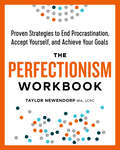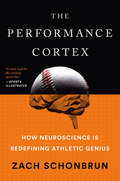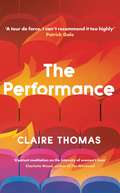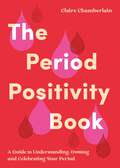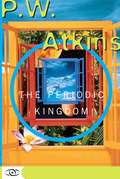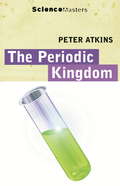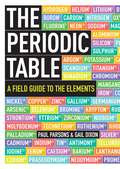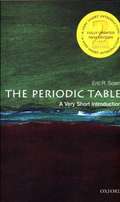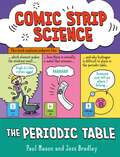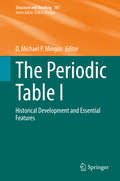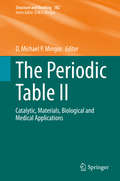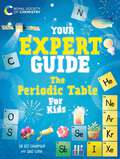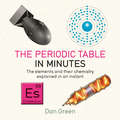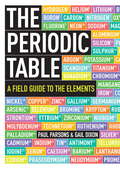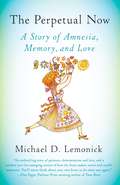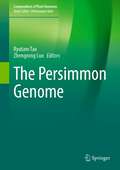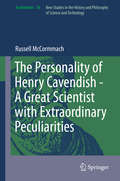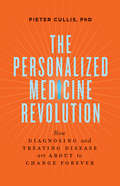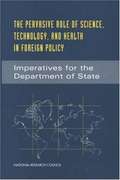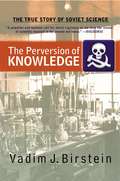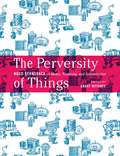- Table View
- List View
The Perfectionism Workbook: Proven Strategies to End Procrastination, Accept Yourself, and Achieve Your Goals
by Taylor Newendorp MA, LCPCThe Perfectionism Workbook offers actionable exercises to help you overcome the barriers created by perfectionism and develop skills for living a healthier, more gratifying life.The desire to continuously improve can be a positive trait that fuels success. However, those same aspirations can also turn into perfectionism, which causes us to put unrealistic pressure on ourselves and set impossible standards that negatively influence how we think and act.In his work as a clinical therapist, Taylor Newendorp has successfully used cognitive behavioral therapy (CBT) to help countless patients who live with the immense pressure of perfectionism and other related issues such as OCD, anxiety disorders, eating disorders, or depression. In The Perfectionism Workbook, Taylor delivers practical, effective exercises to help you change the way you view yourself, set healthy goals, and find contentment in your daily life.The Perfectionism Workbook is a hands-on guide especially designed to identify and resolve the root causes of perfectionism. It these pages you will find:A perfectionism overview that will help you understand the illusion of perfectionism, why it doesn't work, and what you can do to treat your perfectionism.The 5 tendencies of toxic perfectionism: Need for approval and pleasing others; Procrastination, inaction, and paralysis; Fear of making mistakes; Highly self-critical; Judgment of self and others.Practical strategies based on the principles of CBT, mindfulness, and acceptance that will help you quiet your critical inner voice, conquer procrastination, and develop true self-worth.Real-world examples of perfectionism that will provide meaningful opportunity for insight and reflection into your own perfectionism.Perfectionism can have serious consequences, both mentally and physically. But there is a solution—and it can be found in the pages of The Perfectionism Workbook.
The Performance Cortex: How Neuroscience Is Redefining Athletic Genius
by Zach Schonbrun“A must-read for the cerebral sports fan…like Moneyball except nerdier. Much nerdier.” --Sports IllustratedWhy couldn't Michael Jordan, master athlete that he was, crush a baseball? Why can't modern robotics come close to replicating the dexterity of a five-year-old? Why do good quarterbacks always seem to know where their receivers are?On a quest to discover what actually drives human movement and its spectacular potential, journalist, sports writer, and fan Zach Schonbrun interviewed experts on motor control around the world. The trail begins with the groundbreaking work of two neuroscientists in Major League Baseball who are upending the traditional ways scouts evaluate the speed with which great players read a pitch. Across all sports, new theories and revolutionary technology are revealing how the brain's motor control system works in extraordinary talented athletes like Stephen Curry, Tom Brady, Serena Williams, and Lionel Messi; as well as musical virtuosos, dancers, rock climbers, race-car drivers, and more.Whether it is timing a 95 mph fastball or reaching for a coffee mug, movement requires a complex suite of computations that many take for granted--until they read The Performance Cortex. Zach Schonbrun ushers in a new way of thinking about the athletic gifts we marvel over and seek to develop in our own lives. It's not about the million-dollar arm anymore. It's about the million-dollar brain.
The Performance: A Novel
by Claire Thomas'Quietly transformational'The Times 'A tour de force... I can't recommend this too highly'Patrick Gale'Innovative... an original, at-a-sitting read'Daily Mail'A potent meditation on the intensity of women's lives'Charlotte Wood, author of The Weekend'A miracle... Engaging and evocative'Washington Post'I loved and admired The Performance... Unmissable'Emma Stonex, author of The Lamplighters'Lively and intimate... The way Thomas plays with the reader is a sort of genius'Guardian'Thomas writes these women with such wisdom and compassion, that by the end we are all transformed'Claire Fuller, author of Unsettled Ground The false cold of the theatre makes it hard to imagine the heavy wind outside in the real world, the ash air pressing onto the city from the nearby hills where bushfires are taking hold.The house lights lower.The auditorium feels hopeful in the darkness.As bushfires rage outside the city, three women watch a performance of a Beckett play.Margot is a successful professor, preoccupied by her fraught relationship with her ailing husband. Ivy is a philanthropist with a troubled past, distracted by the snoring man beside her. Summer is a young theatre usher, anxious about the safety of her girlfriend in the fire zone.As the performance unfolds, so does each woman's story. By the time the curtain falls, they will all have a new understanding of the world beyond the stage.
The Perfume Lover: A Personal History of Scent
by Denyse BeaulieuThe Perfume Lover is a candid personal account of the process of composing a fragrance, filled with sensual scent descriptions, sexy tidbits, and historical vignettes.What if the most beautiful night in your life inspired a perfume? When Denyse Beaulieu was growing up near Montreal, perfume was forbidden in her house, spurring a childhood curiosity that became an intellectual and sensual passion. It is this passion she pursued all the way to Paris, where she now lives, and which led her to become a respected fragrance writer. But little did she know that it would also lead her to achieve a perfume lover's wildest dream: When Denyse tells famous perfumer Betrand Duchaufour at L'Artisan Parfumeur of a sensual night spent in Seville under a blossoming orange tree, wrapped in the arms of a beautiful man, the story stirs his imagination and together they create a scent that captures the essence of that night. As their unique creative collaboration unfolds, the perfume-in-progress conjures intimate memories, leading Beaulieu to make sense of her life through scents. Throughout the book, she weaves the evocative history of perfumery into her personal journey, in an intensely passionate voice: the masters and the masterpieces, the myths and the myth-busting, down to the molecular mysteries that weld our flesh to flowers.Now, just to set your nostrils aquiver: Séville à l'aube is an orange blossom oriental with zesty, green and balsamic effects, with notes of petitgrain, petitgrain citronnier, orange blossom, beeswax, incense, and lavender, and is now available at fragrance outlets in the U.S.
The Period Positivity Book: A Guide to Understanding, Owning and Celebrating Your Period
by Claire ChamberlainEmbrace period positivity and get to know your cycle with this frank and empowering guide to menstrual health. This book is here to open up the conversation, break the taboo, and answer the questions you were too afraid to ask. Through tips and invaluable advice, you'll learn everything you need to know about how your period affects you.
The Periodic Kingdom: A Journey Into The Land Of The Chemical Elements (Science Master)
by P. W. AtkinsCome on a journey into the heart of matter--and enjoy the process!--as a brilliant scientist and entertaining tour guide takes you on a fascinating voyage through the Periodic Kingdom, the world of the elements. The periodic table, your map for this trip, is the most important concept in chemistry. It hangs in classrooms and labs throughout the world, providing support for students, suggesting new avenues of research for professionals, succinctly organizing the whole of chemistry. The one hundred or so elements listed in the table make up everything in the universe, from microscopic organisms to distant planets. Just how does the periodic table help us make sense of the world around us? Using vivid imagery, ingenious analogies, and liberal doses of humor P. W. Atkins answers this question. He shows us that the Periodic Kingdom is a systematic place. Detailing the geography, history and governing institutions of this imaginary landscape, he demonstrates how physical similarities can point to deeper affinities, and how the location of an element can be used to predict its properties. Here’s an opportunity to discover a rich kingdom of the imagination kingdom of which our own world is a manifestation.
The Periodic Kingdom: A Journey Into the Land of the Chemical Elements (SCIENCE MASTERS)
by Peter AtkinsA 'travel guide' to the periodic table, explaining the history, geography and the rules of behaviour in this imagined land.The Periodic Kingdom is a journey of imagination in which Peter Atkins treats the periodic table of elements - the 109 chemical elements in the world, from which everything is made - as a country, a periodic kingdom, each region of which corresponds to an element. Arranged much like a travel guide, the book introduces the reader to the general features of the table, the history of the elements, and the underlying arrangement of the table in terms of the structure and properties of atoms.Atkins sees elements as finely balanced living personalities, with quirks of character and certain, not always outward, dispositions, and the kingdom is thus a land of intellectual satisfaction and infinite delight.
The Periodic Table
by Paul ParsonsAs one of the most recognizable images in science, the periodic table is ingrained in our culture. First drawn up in 1869 by Dmitri Mendeleev, its 118 elements make up not only everything on our planet but also everything in the entire universe.The Periodic Table looks at the fascinating story and surprising uses of each of those elements, whether solid, liquid or gas. From the little-known uses of gold in medicine to the development of the hydrogen bomb, each entry is accompanied by technical data (category, atomic number, weight, boiling point) presented in easy-to-read headers, and a colour coding system that helps the reader to navigate through the different groups of elements.A remarkable display of thought-provoking science and beautiful photography, this guide will allow the reader to discover the world afresh.
The Periodic Table (A Very Short Introduction)
by Eric R. ScerriIn this Very Short Introduction Eric R. Scerri looks at the trends in properties of elements that led to the construction of the table, and shows how the deeper meaning of the table's structure gradually became apparent with the development of atomic theory and, in particular, quantum mechanics, which underlies the behaviour of all of the elements and their compounds.
The Periodic Table (Comic Strip Science #5)
by Paul MasonComic Strip Science: The Periodic Table makes learning about science fun! Each spread features a short, funny comic strip related to the periodic table. Discover which element started a war among dentists, why diamonds aren't forever and the freaky story of how phosphorous was discovered. Around the strips, diagrams and panels give further information on the topic. They are a fantastic way to engage children aged 8 plus with science.The illustrator, Jess Bradey, is winner of the 2021 Blue Peter Award for Best Non-Fiction for A Day in the Life of a Poo, Gnu and You and also writes and draws for The Phoneix Comic. Titles in the series: Biology, Chemistry, Earth and Space, Physics, The Periodic Table.
The Periodic Table I: Historical Development and Essential Features (Structure and Bonding #181)
by D. Michael P. MingosAs 2019 has been declared the International Year of the Periodic Table, it is appropriate that Structure and Bonding marks this anniversary with two special volumes.In 1869 Dmitri Ivanovitch Mendeleev first proposed his periodic table of the elements. He is given the major credit for proposing the conceptual framework used by chemists to systematically inter-relate the chemical properties of the elements. However, the concept of periodicity evolved in distinct stages and was the culmination of work by other chemists over several decades. For example, Newland’s Law of Octaves marked an important step in the evolution of the periodic system since it represented the first clear statement that the properties of the elements repeated after intervals of 8. Mendeleev’s predictions demonstrated in an impressive manner how the periodic table could be used to predict the occurrence and properties of new elements. Not all of his many predictions proved to be valid, but the discovery of scandium, gallium and germanium represented sufficient vindication of its utility and they cemented its enduring influence. Mendeleev’s periodic table was based on the atomic weights of the elements and it was another 50 years before Moseley established that it was the atomic number of the elements, that was the fundamental parameter and this led to the prediction of further elements. Some have suggested that the periodic table is one of the most fruitful ideas in modern science and that it is comparable to Darwin’s theory of evolution by natural selection, proposed at approximately the same time. There is no doubt that the periodic table occupies a central position in chemistry. In its modern form it is reproduced in most undergraduate inorganic textbooks and is present in almost every chemistry lecture room and classroom. This first volume provides chemists with an account of the historical development of the Periodic Table and an overview of how the Periodic Table has evolved over the last 150 years. It also illustrates how it has guided the research programmes of some distinguished chemists.
The Periodic Table II: Catalytic, Materials, Biological and Medical Applications (Structure and Bonding #182)
by D. Michael P. MingosAs 2019 has been declared the International Year of the Periodic Table, it is appropriate that Structure and Bonding marks this anniversary with two special volumes.In 1869 Dmitri Ivanovitch Mendeleev first proposed his periodic table of the elements. He is given the major credit for proposing the conceptual framework used by chemists to systematically inter-relate the chemical properties of the elements. However, the concept of periodicity evolved in distinct stages and was the culmination of work by other chemists over several decades. For example, Newland’s Law of Octaves marked an important step in the evolution of the periodic system since it represented the first clear statement that the properties of the elements repeated after intervals of 8. Mendeleev’s predictions demonstrated in an impressive manner how the periodic table could be used to predict the occurrence and properties of new elements. Not all of his many predictions proved to be valid, but the discovery of scandium, gallium and germanium represented sufficient vindication of its utility and they cemented its enduring influence. Mendeleev’s periodic table was based on the atomic weights of the elements and it was another 50 years before Moseley established that it was the atomic number of the elements, that was the fundamental parameter and this led to the prediction of further elements. Some have suggested that the periodic table is one of the most fruitful ideas in modern science and that it is comparable to Darwin’s theory of evolution by natural selection, proposed at approximately the same time. There is no doubt that the periodic table occupies a central position in chemistry. In its modern form it is reproduced in most undergraduate inorganic textbooks and is present in almost every chemistry lecture room and classroom. This second volume provides chemists with an overview of the important role played by the Periodic Table in advancing our knowledge of solid state and bioinorganic chemistry. It also illustrates how it has been used to fine-tune the properties of compounds which have found commercial applications in catalysis, electronics, ceramics and in medicinal chemistry.
The Periodic Table for Young Scientists (Your Expert Guide #1)
by Dr Dr Kit ChapmanFrom a top expert in the world of science comes this definitive guide to the Periodic Table, published in partnership with the Royal Society of Chemistry.In Your Expert Guide: The Periodic Table, discover the origins and genius of the Periodic Table: how the idea came about, what each symbol means and how it underpins our understanding of matter, materials and the study of chemistry. Explore the elements at work in our world and get a clear picture of the Periodic Table's role in explaining the building blocks of the Universe.Written by Dr Kit Chapman, award-winning science journalist, academic at Falmouth University and global science communicator. Published in partnership with The Royal Society of Chemistry, the internationally renowned nonprofit organisation with the same mission since 1841: to advance excellence in the chemical sciences. With lovely artwork by Dao Linh, see the elements come alive for curious readers aged 8+.Books in the Your Expert Guide series:With the Royal Society of Chemistry: The Periodic Table and Chemistry for Young ScientistsWith the Royal Society of Biology: The Human Body and Biology for Young ScientistsWith the Institute of Physics: The Universe for Kids and Physics for Young Scientists
The Periodic Table in Minutes (In Minutes)
by Dan GreenAn icon of science, the Periodic Table defines the fundamental chemistry of everything in the universe. In this compact yet comprehensive guide, Dan Green outlines the history, development and workings of the table, shows how its design reflects and illuminates the organisation of all matter, and even explains what it has to tell us about the chemistry of distant stars and of our own bodies. Contents include an individual entry for every known element? detailing properties, uses and key data, and sections on the patterns and groups of the famous table, as well as explanations of basic chemistry concepts such as elements and compounds, atomic structure, chemical bonds, reactions and radioactivity, amongst many others.
The Periodic Table: A Field Guide to the Elements
by Paul Parsons Gail DixonThe Periodic Table is one of the most recognizable images in science - and in our culture. Its 118 elements make up everything on our planet and in the entire universe. But how many of us actually know how to interpret its distinctive design? And what does its unique arrangement tell us about the behaviour of each element in the world around us? The Periodic Table looks at the fascinating story and surprising history of each of these elements, from the little-known uses of gold in medicine to that of arsenic as a wallpaper dye in the ninteenth-century and the development of the hydrogen bomb. Packed with interesting facts and figures and helpful illustrations, this accessible guide will help the armchair chemist navigate through the different groups of elements - and discover the world afresh.
The Periodic Table: A Field Guide to the Elements
by Paul Parsons Gail DixonThe Periodic Table is one of the most recognizable images in science - and in our culture. Its 118 elements make up everything on our planet and in the entire universe. But how many of us actually know how to interpret its distinctive design? And what does its unique arrangement tell us about the behaviour of each element in the world around us? The Periodic Table looks at the fascinating story and surprising history of each of these elements, from the little-known uses of gold in medicine to that of arsenic as a wallpaper dye in the ninteenth-century and the development of the hydrogen bomb. Packed with interesting facts and figures and helpful illustrations, this accessible guide will help the armchair chemist navigate through the different groups of elements - and discover the world afresh.
The Perpetual Now: A Story of Amnesia, Memory, and Love
by Michael D. LemonickIn the aftermath of a shattering illness, Lonni Sue Johnson lives in a "perpetual now," where she has almost no memories of the past and a nearly complete inability to form new ones. The Perpetual Now is the moving story of this exceptional woman, and the groundbreaking revelations about memory, learning, and consciousness her unique case has uncovered. Lonni Sue Johnson was a renowned artist who regularly produced covers for The New Yorker, a gifted musician, a skilled amateur pilot, and a joyful presence to all who knew her. But in late 2007, she contracted encephalitis. The disease burned through her hippocampus like wildfire, leaving her severely amnesic, living in a present that rarely progresses beyond ten to fifteen minutes. Remarkably, she still retains much of the intellect and artistic skills from her previous life, but it's not at all clear how closely her consciousness resembles yours or mine. As such, Lonni Sue's story has become part of a much larger scientific narrative—one that is currently challenging traditional wisdom about how human memory and awareness are stored in the brain. In this probing, compassionate, and illuminating book, award-winning science journalist Michael D. Lemonick uses the unique drama of Lonni Sue Johnson's day-to-day life to give us a nuanced and intimate understanding of the science that lies at the very heart of human nature.
The Perpetuation of Living Beings
by Thomas Henry HuxleyEarly scientific work on heredity variance and genetic transmission.
The Persecuted Drug: The Story of DMSO
by Pat McgradyDMSO remains a truly amazing substance. It is a versatile solvent; it probably will dissolve more chemicals than any other solvent. It penetrates the skin and is in the bloodstream within seconds; and it carries many dissolved chemicals with it. It freezes at a couple of degrees below room temperature. As a runoff product of the paper industry, it is abundant and should be cheap. (With inflation and the middleman's profits, its price during the last half-dozen years has multiplied thirty fold. But considering its many uses, it still is cheap at the current $10 a pint.)
The Persimmon Genome (Compendium of Plant Genomes)
by Ryutaro Tao Zhengrong LuoThis book will expound the latest information on the current state of persimmon genomics and transcriptomics, with a particular focus on the latest findings and analysis in relation to the most important agronomic traits. The genus Diospyros contains about 400 species distributed all continents of the globe. Most of Diospyros species are distributed in the tropical and subtropical regions, while cultivated persimmon or simply kaki (Diospyros kaki) originates in East Asia and has been grown in China, Japan and Korea for many years. World production of persimmon has been increasing continuously since 1990s, with China being the most producer. Outside Asia, kaki production has been rapidly increasing in Spain in recent years. Because kaki is mostly hexaploid (2n = 6x =90) and its genome size is quite large with the flow cytometric analysis estimation of about 900 Mb, genetic and molecular studies in persimmon are quite complicated. Diploid close relatives of kaki, D. lotus and D. oleifera have been recently used as model species of kaki. Utilizing these species, molecular basis of several economically molecular basis of important traits such as sexuality and astringency has been studied, giving important information for kaki breeding.
The Personality of Henry Cavendish - A Great Scientist with Extraordinary Peculiarities
by Russell MccormmachProfiles the eminent 18th century natural philosopher Henry Cavendish, best known for his work in chemistry and physics and one of the most baffling personalities in the history of science. In these chapters we are introduced to the psychology of science and of scientists and we learn about Cavendish's life and times. His personality is examined from two perspectives: one is that he had a less severe form of autism, as has been claimed; the other is that he was eccentric and a psychological disorder was absent. Henry Cavendish lived a life of science, possibly more completely than any other figure in the history of science: a wealthy aristocrat, he became a dedicated scientist. This study brings new information and a new perspective to our understanding of the man. The scientific and non-scientific sides of his life are brought closer together, as the author traces topics including his appearance, speech, wealth, religion and death as well as Cavendish's life of natural philosophy where objectivity and accuracy, writing and recognition all played a part. The author traces aspects of Cavendish's personality, views and interpretations of him, and explores notions of eccentricity and autism before detailing relevant aspects of the travels made by our subject. The author considers the question "How do we talk about Cavendish?" and provides a useful summary of Cavendish's travels. This book will appeal to a wide audience, from those interested in 18th century history or history of science, to those interested in incidences of autism in prominent figures from history. This volume contains ample relevant illustrations, several interesting appendices and it includes a useful index and bibliography.
The Personalized Medicine Revolution
by Pieter CullisEvery one of us is unique. With recent advances in technology, we now know that that statement is more true that ever: we are each individuals, right down to a molecular level - a one-of-a-kind combination of genes, proteins, and metabolism. So why does healthcare still take a one-size-fits-all approach? The same methods are used on everyone to diagnose illness, and the same drugs are used to treat it - despite the fact that those methods and treatments are not effective for everyone and are even harmful for some. Shouldn't our medicine be tailored to our differences? The Personalized Medicine Revolution explores recent advances in genomics, the study of the human genome - as well as its cousins proteomics, metabolomics, microbiomics, and the like - and explains how technology is even now changing the way medicine is delivered. Along the way, it takes the reader through the five critical healthcare areas that will be transformed most radically by personalized medicine - prediction, prevention, diagnosis, treatment, and monitoring - and examines the practical and ethical issues involved. Finally, it details how readers can use personalized medicine to take charge of their own health and build a stronger and safer medical system.
The Pervasive Role of Science, Technology, and Health in Foreign Policy: Imperatives for the Department of State
by Technology Committee on Science Health Aspects of the Foreign Policy Agenda of the United StatesIssues involving science, technology, and health (STH) have moved to the forefront of the international diplomatic agenda. Other vital issues linked to technological developments pervade longer-range foreign policy concerns. Thus, STH considerations are often central to the Department of State’s bilateral and multilateral interactions with other governments. STH aspects play a large role in discussions of such critical topics as nuclear nonproliferation, use of outer space, population growth, adequate and safe food supply, climate change, infectious diseases, energy resources, and competitiveness of industrial technologies. In addressing these issues, expert STH knowledge is essential to the anticipation and resolution of problems and to the achievement of foreign policy goals. The Department, recognizing that it requires strengthened capabilities to address such an array of topics, asked for suggestions by the National Research Council as to how it could better deal with foreign policy issues with STH content.
The Perversion of Knowledge: The True Story of Soviet Science
by Vadim J. BirsteinDuring the Soviet years, Russian science was touted as one of the greatest successes of the regime. Russian science was considered to be equal, if not superior, to that of the wealthy western nations. The Perversion of Knowledge, a history of Soviet science that focuses on its control by the KGB and the Communist Party, reveals the dark side of this glittering achievement. Based on the author’s firsthand experience as a Soviet scientist, and drawing on extensive Russian language sources not easily available to the Western reader, the book includes shocking new information on biomedical experimentation on humans as well as an examination of the pernicious effects of Trofim Lysenko’s pseudo-biology. Also included are many poignant case histories of those who collaborated and those who managed to resist, focusing on the moral choices and consequences. The text is accompanied by the author’s own translations of key archival materials, making this work an essential resource for all those with a serious interest in Russian history.
The Perversity of Things: Hugo Gernsback on Media, Tinkering, and Scientifiction (Electronic Mediations #52)
by Hugo GernsbackIn 1905, a young Jewish immigrant from Luxembourg founded an electrical supply shop in New York. This inventor, writer, and publisher Hugo Gernsback would later become famous for launching the first science fiction magazine, Amazing Stories, in 1926. But while science fiction&’s annual Hugo Awards were named in his honor, there has been surprisingly little understanding of how the genre began among a community of tinkerers all drawn to Gernsback&’s vision of comprehending the future of media through making. In The Perversity of Things, Grant Wythoff makes available texts by Hugo Gernsback that were foundational both for science fiction and the emergence of media studies.Wythoff argues that Gernsback developed a means of describing and assessing the cultural impact of emerging media long before media studies became an academic discipline. From editorials and blueprints to media histories, critical essays, and short fiction, Wythoff has collected a wide range of Gernsback&’s writings that have been out of print since their magazine debut in the early 1900s. These articles cover such topics as television; the regulation of wireless/radio; war and technology; speculative futures; media-archaeological curiosities like the dynamophone and hypnobioscope; and more. All together, this collection shows how Gernsback&’s publications evolved from an electrical parts catalog to a full-fledged literary genre.The Perversity of Things aims to reverse the widespread misunderstanding of Gernsback within the history of science fiction criticism. Through painstaking research and extensive annotations and commentary, Wythoff reintroduces us to Gernsback and the origins of science fiction.
